This article was medically reviewed by Pradeep Adatrow, DDS, MS. Dr. Pradeep Adatrow is the only board certified Dentist, Periodontist, and Prosthodontist in the southern United States. With over 15 years of experience, Dr. Adatrow specializes in dental implants, TMJ treatments, periodontal plastic surgery, surgical and non-surgical periodontics, bone regeneration, laser treatments, and soft tissue and gum graft procedures. He received a BS in Epidemiology and Biostatistics from the University of Alabama and earned his Doctor of Dental Surgery (DDS) degree from the University of Tennessee College of Dentistry. Dr. Adatrow then completed a three-year postgraduate program in periodontics and implantology at Indiana University and went on to complete another three-year postdoctoral program in advanced prosthodontics from the University of Tennessee. He also serves as a full-time professor and the Director of Surgical Prosthodontics at the University of Tennessee. Dr. Adatrow received the Dean's Junior Faculty Award and the John Diggs Faculty Award, and he was inducted into the Deans Odontological Society. He is board certified by the American Board of Periodontology and is a Fellow of the prestigious International College of Dentistry – a feat that only 10,000 others worldwide can claim.
There are 9 references cited in this article, which can be found at the bottom of the page.
This article has been viewed 352,823 times.
Boils that form on your gums are often very painful, and can cause difficulties eating, drinking, and speaking comfortably. They can be caused by tooth decay, heavy plaque build-up, or trapped food particles on your gums.[1] They can come up without warning and are often stubborn, but there are ways to help get rid of one and treat the site afterwards to prevent it from returning.
Steps
Removing Gum Boils Professionally
-
1Get the boil surgically removed. If you have chronic gum boils, or gum boils that are cosmetically embarrassing, you may want to consider getting them surgically removed. This can greatly increase the chance of the boil not returning again. You’ll need to speak with a gum specialist, such as a periodontist, about this option to see what they recommend.[2]
- Your dentist or gum specialist may recommend simply draining the boil instead of surgically removing it, depending on the location of the boil and how complicated it would be to remove it.[3] In this case they will give you antibiotics to take for at least five days after draining.
-
2Look into periodontal therapy. Many gum boils are caused by active gum disease or some other kind of periodontal disease that leads to periodontal abscesses. If this is the case for you, it may be important to get a deep cleaning from your dentist in order to remove any active bacteria from the inside of your mouth that could be contributing to the gum boil.[4]
- If this seems to help, you’ll want to be sure to continue with regular visits for cleanings to help keep your oral bacteria levels down and to maintain your overall oral health.
- Consider gum surgery if your periodontist decides it is the best way to prevent future infections or gum boils
Advertisement -
3Consider root canal therapy.[5] Some gum boils are caused by dental abscesses. In these cases, root canal therapy would be required to remove the bacteria and decayed enamel from the area. Once the root canal is performed, a crown or filling is inserted and sealed to protect the tooth and the mouth from further infection.[6]
- Root canals can be quite expensive and require multiple visits to perform, so make sure you look into the cost before you agree to the surgery.
Using Home Remedies to Remove Gum Boils
-
1Use a salt mouthwash.[7] This will help reduce swelling and dry up or draw out any infection that might be present in the gum boil. Fill half a tumbler or glass with lukewarm water and add half a teaspoon of standard table salt. Mix until the salt is dissolved. It doesn't matter if some remains in the bottom of the glass. Use the saltwater as you would your usual mouthwash, but be careful to keep a special emphasis on the infected site when you're rinsing. Do not swallow the saltwater.[8]
- Continue washing with the salt washes once or twice a day for a week to help heal the boil. This will reduce chances of it coming back. At the same time, be sure to maintain a good dental hygiene routine.
- This method is recommended by oral health professionals and is clinically proven to be effective, but is not a replacement for a visit to your dentist.
-
2Apply essential oils. Applying essential oils topically to a gum boil can help reduce the levels of bacteria present and improve the overall tissue health. Combined, these factors can lead to the dissipation of a gum boil without needing to seek professional help. Simply add a few drops of the essential oil to a glass of water and rinse your mouth thoroughly.[9]
- Some good essential oils to choose are spearmint or peppermint oils.
- Be sure not to swallow the essential oil mixture.
- Remember that this is a recommended home remedy and has not been proven effective with scientific evidence.
-
3Eat raw onions. Consuming raw onions can be a very effective home remedy for treating gum boils. Onions contain relatively high levels of sulfur, which can help heat up and dry up existing boils in your mouth.[10]
- This is a home remedy and may be less effective than other solutions that have been verified by medical professionals.
- If you don’t like the taste of raw onions, try eating them on other things — like in salads or on sandwiches where the flavor is masked.
- Don’t cook the onions as this can reduce the amount of sulfur present in the vegetable.
Preventing Gum Boils
-
1Brush daily. Brushing your teeth regularly (at least twice a day) is probably the single most important thing you can do to prevent gum boils, as well as other conditions such as receding gums, and to contribute positively to your general oral health. Brushing helps reduce bacteria and germs that are present in your mouth, as well as removing plaque and food particles.[11]
- Use a toothbrush with soft bristles and talk your dentist about proper brushing technique.
-
2Floss your teeth daily. Flossing is one of the best ways to help reduce plaque and bacteria buildup in your mouth. Since overall oral health is crucial for preventing gum boils, it is very important to floss regularly — especially if you have trouble with chronic or recurring gum boils.[12]
- Most dentists recommend that you floss twice daily.
-
3Use an antibacterial mouth rinse. Since bacterial buildup is one of the main causes of gum boils, it is important to do everything possible to minimize the amount of bad bacteria in your mouth. A good way to do this is to incorporate an antibacterial mouth rinse into your daily oral care regimen. Use it after flossing and before going to bed.
- When choosing your mouthwash, the brand doesn’t really matter. Just make sure that the packaging indicates the product is antibacterial and look for the American Dental Association seal to ensure you’re purchasing a quality product.[13]
-
4Visit the dentist regularly. The best way to prevent gum boils is to maintain proper and consistent oral care. This includes regular visits to the dentist for cleanings and checkups. Your dentist or dental hygienist can help remove any plaque buildup and they can also let you know if they see any problems or recommend any specific courses of action.[14]
- Your dentist can also probably spot signs of tooth decay or other periodontal problems much earlier than you can, so this will help you spot symptoms or causes of gum boils early on.
- Regular dental visits should occur twice a year (once every six months).
Our Most Loved Articles & Quizzes
Expert Q&A
Did you know you can get expert answers for this article?
Unlock expert answers by supporting wikiHow
-
QuestionCan I treat gum boils at home?
 Pradeep Adatrow, DDS, MSDr. Pradeep Adatrow is the only board certified Dentist, Periodontist, and Prosthodontist in the southern United States. With over 15 years of experience, Dr. Adatrow specializes in dental implants, TMJ treatments, periodontal plastic surgery, surgical and non-surgical periodontics, bone regeneration, laser treatments, and soft tissue and gum graft procedures. He received a BS in Epidemiology and Biostatistics from the University of Alabama and earned his Doctor of Dental Surgery (DDS) degree from the University of Tennessee College of Dentistry. Dr. Adatrow then completed a three-year postgraduate program in periodontics and implantology at Indiana University and went on to complete another three-year postdoctoral program in advanced prosthodontics from the University of Tennessee. He also serves as a full-time professor and the Director of Surgical Prosthodontics at the University of Tennessee. Dr. Adatrow received the Dean's Junior Faculty Award and the John Diggs Faculty Award, and he was inducted into the Deans Odontological Society. He is board certified by the American Board of Periodontology and is a Fellow of the prestigious International College of Dentistry – a feat that only 10,000 others worldwide can claim.
Pradeep Adatrow, DDS, MSDr. Pradeep Adatrow is the only board certified Dentist, Periodontist, and Prosthodontist in the southern United States. With over 15 years of experience, Dr. Adatrow specializes in dental implants, TMJ treatments, periodontal plastic surgery, surgical and non-surgical periodontics, bone regeneration, laser treatments, and soft tissue and gum graft procedures. He received a BS in Epidemiology and Biostatistics from the University of Alabama and earned his Doctor of Dental Surgery (DDS) degree from the University of Tennessee College of Dentistry. Dr. Adatrow then completed a three-year postgraduate program in periodontics and implantology at Indiana University and went on to complete another three-year postdoctoral program in advanced prosthodontics from the University of Tennessee. He also serves as a full-time professor and the Director of Surgical Prosthodontics at the University of Tennessee. Dr. Adatrow received the Dean's Junior Faculty Award and the John Diggs Faculty Award, and he was inducted into the Deans Odontological Society. He is board certified by the American Board of Periodontology and is a Fellow of the prestigious International College of Dentistry – a feat that only 10,000 others worldwide can claim.
Board Certified Dentist & Oral Surgeon
Warnings
- If you have had boils before, or continue to get them, this could signify an underlying problem with your teeth and you should see a dentist as soon as you can.⧼thumbs_response⧽
- Swallowing saltwater mouthwash can cause nausea and vomiting.⧼thumbs_response⧽
- It is always best to see a specialist before trying to deal with an infection of this kind yourself.⧼thumbs_response⧽
References
- ↑ Pradeep Adatrow, DDS, MS. Board Certified Dentist & Oral Surgeon. Expert Interview. 30 September 2020.
- ↑ http://patient.info/health/abscess-leaflet
- ↑ Pradeep Adatrow, DDS, MS. Board Certified Dentist & Oral Surgeon. Expert Interview. 30 September 2020.
- ↑ Pradeep Adatrow, DDS, MS. Board Certified Dentist & Oral Surgeon. Expert Interview. 30 September 2020.
- ↑ Pradeep Adatrow, DDS, MS. Board Certified Dentist & Oral Surgeon. Expert Interview. 30 September 2020.
- ↑ http://www.oramd.com/gum-boils-what-it-is-what-causes-it-what-to-do-about-it/
- ↑ Pradeep Adatrow, DDS, MS. Board Certified Dentist & Oral Surgeon. Expert Interview. 30 September 2020.
- ↑ http://www.aviva.co.uk/health-insurance/home-of-health/medical-centre/medical-encyclopedia/entry/dental-abscess/
- ↑ http://www.healingteethnaturally.com/essential-oils-for-oral-care-and-healing-of-gums.html
- ↑ http://www.home-remedies-for-you.com/askquestion/7221/treatment-for-boils-in-mouth.html
- ↑ http://www.nhs.uk/conditions/gum-disease/pages/introduction.aspx
- ↑ http://www.oramd.com/gum-boils-what-it-is-what-causes-it-what-to-do-about-it/
- ↑ http://www.ada.org/en/science-research/ada-seal-of-acceptance/product-category-information/mouthrinses
- ↑ https://www.dentalhealth.org/blog/the-importance-of-regular-dental-visits
About This Article
To get rid of a gum boil at home, mix half a glass of lukewarm water with half a teaspoon of table salt until the salt is dissolved. Then, use the saltwater like your usual mouthwash, and spit it out. Repeat this twice a day for a week to help heal your boil. Alternatively, mix water with a few drops of an essential oil, like spearmint or peppermint, instead of salt. You can also chew raw onion, since the sulfur in it helps to heat up and dry out your boil. If you don’t want to eat raw onion on its own, mix it in a sandwich or salad. For more tips from our Dental co-author, including how to prevent gum boils in the future, read on!

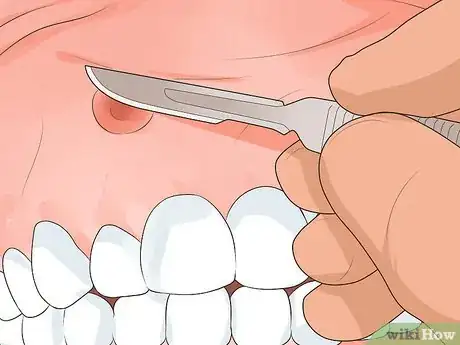
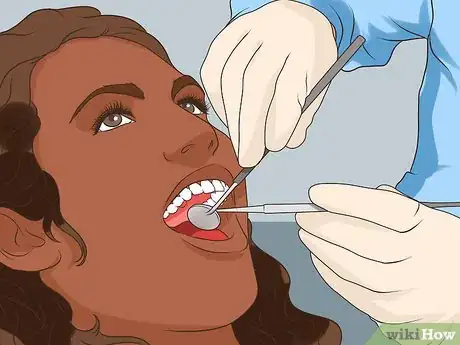
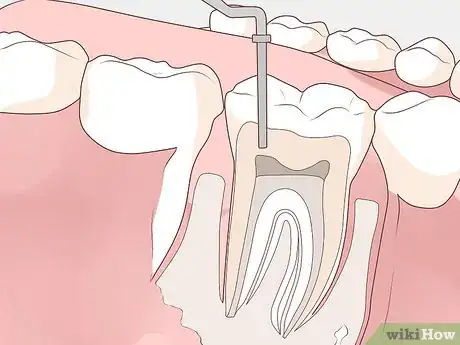
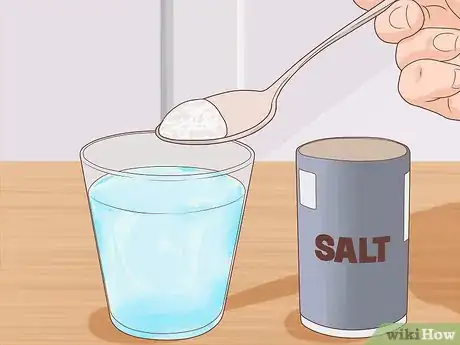
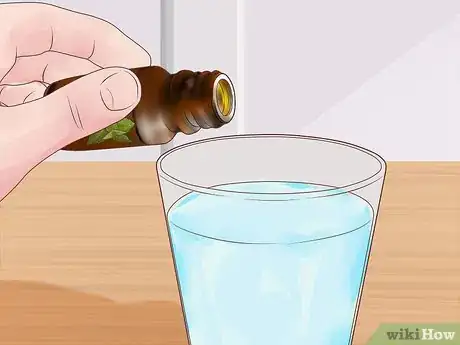
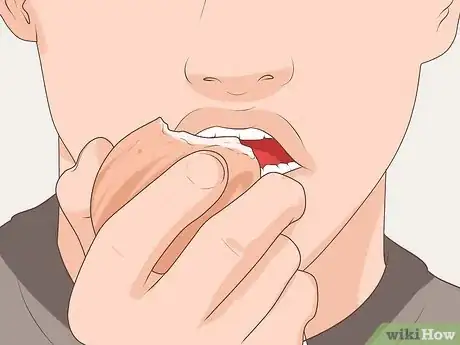
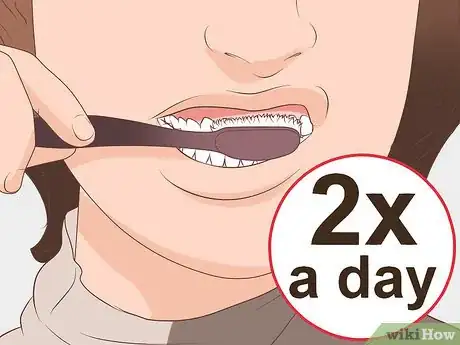
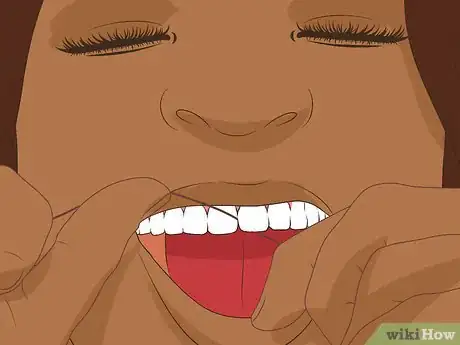
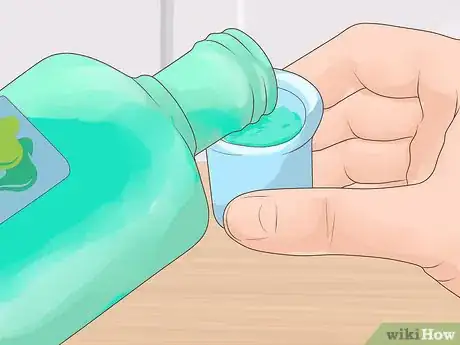
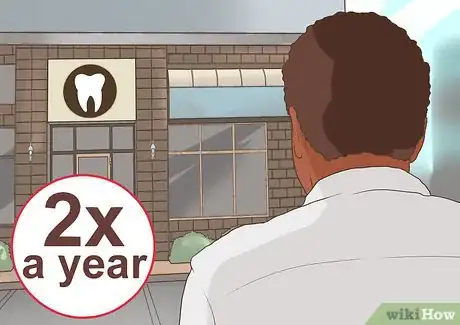










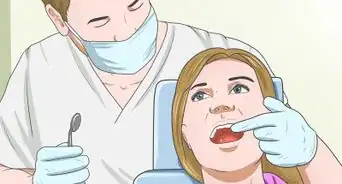
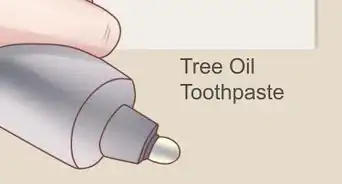


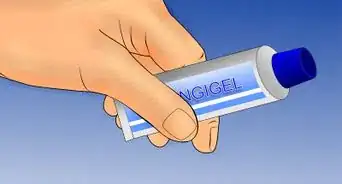

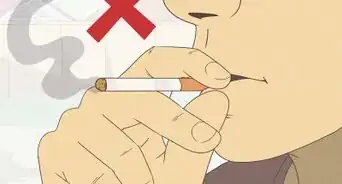
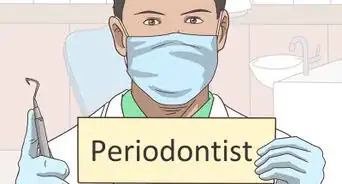
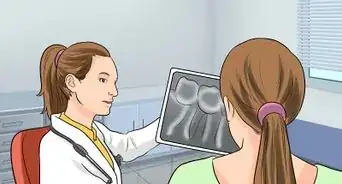









































Medical Disclaimer
The content of this article is not intended to be a substitute for professional medical advice, examination, diagnosis, or treatment. You should always contact your doctor or other qualified healthcare professional before starting, changing, or stopping any kind of health treatment.
Read More...